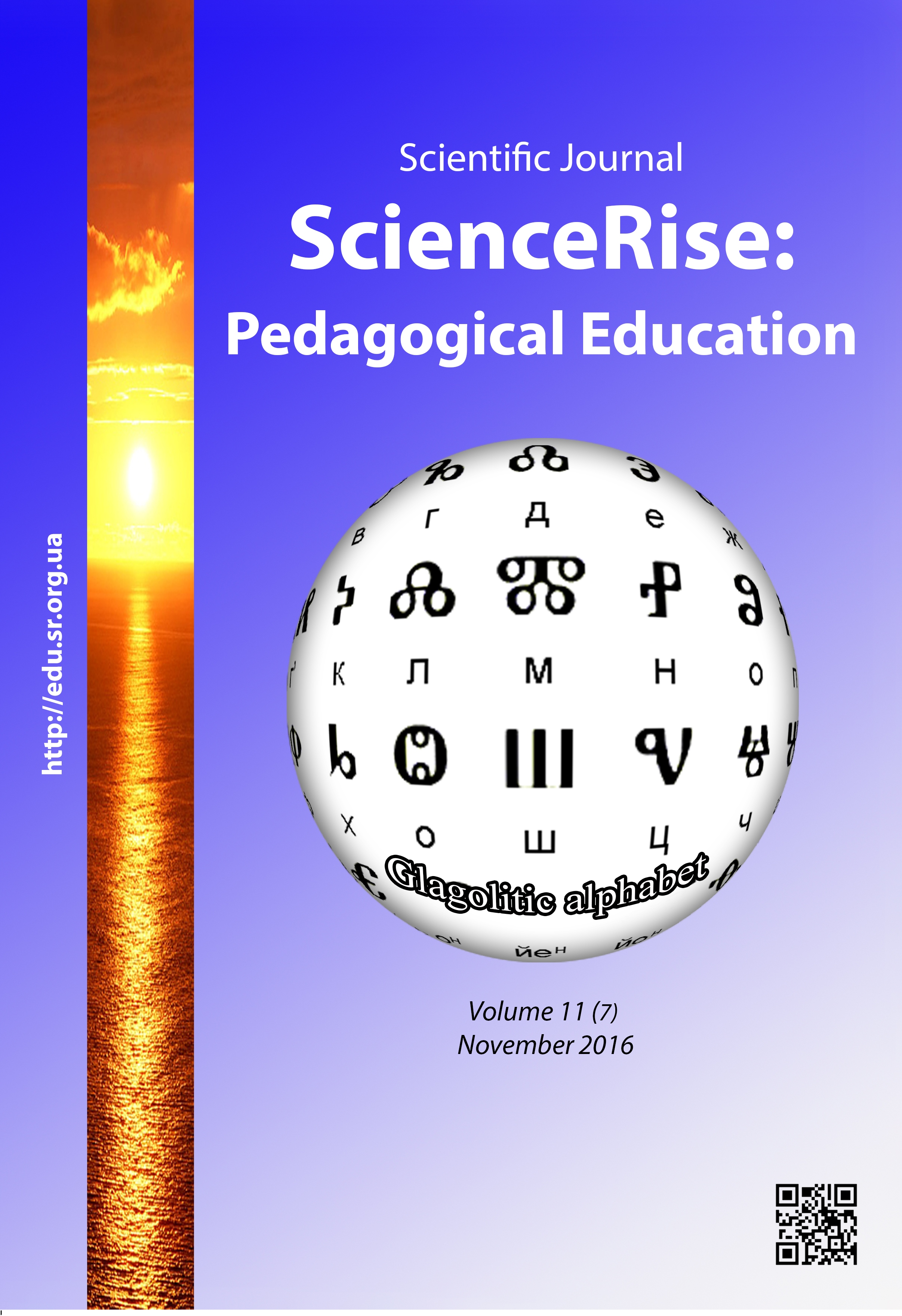The work on formation of the correct diction of primary school pupils
DOI:
https://doi.org/10.15587/2519-4984.2016.84688Keywords:
correct diction, speech technique, sound system of Ukrainian, lessons of readingAbstract
The effectiveness of experimental methodology of formation of correct diction in younger schoolchildren that revealed the significant improvement of orthographic knowledge and skills of the primary school pupils was confirmed in the article. The problem of research is topical and is in pedagogical and methodological grounding of the bases of formation of the correct diction in younger schoolchildren and revelation of specificity of the development of these skills at the lessons of reading at primary school.
The psychological-pedagogical and learning-methodological literature on the problem of research was grounded and analyzed; the content of notions “correct diction”, “speech technique” was fully elucidated.
The material of experimental study that opens didactic direction of the method of formation of correct expressive abilities in younger schoolchildren and experimental methodology of formation of correct diction in younger schoolchildren are significant for the learning practice.
The effectiveness of elaborated system of the system of exercises was experimentally proved; the pedagogical conditions that provide the optimal mastering of reading process were revealedReferences
- Prezydent Ukrai'ny. Oficijne internet-predstavnyctvo. Available at: http://www.president.gov.ua/documents/15828.html
- Mizhnarodnyj Fond «Vidrodzhennja». Available at: http://www.irf.ua/.../koncepciya_rozvytku_osvity_na_period_20152025rr
- Nova ukrai'ns'ka shkola. Available at: http://mon.gov.ua/activity/education/zagalna-serednya/ua-sch-2016/
- Pro zasady derzhavnoi' movnoi' polityky (2012). Verhovna Rada Ukrai'ny, 5029-VI. Available at: http://zakon2.rada.gov.ua/laws/show/5029-17
- Pro zatverdzhennja Koncepcii' literaturnoi' osvity (2011). Ministerstvo osvity i nauky Ukrai'ny, 58. Available at: http://osvita.ua/legislation/Ser_osv/13508/
- Amat'jeva, O. P. (1998). Metodyka navchannja vyraznosti movlennja ditej starshogo doshkil'nogo viku. Odesa, 24.
- Paskal', O. V. (1997). Pedagogichne koryguvannja vymovnyh navychok rosijs'kogo movlennja uchniv pershyh klasiv. Odesa, 21.
- Tryfonova, O. S. (1998). Metodyka vyhovannja zvukovoi' kul'tury movlennja ditej seredn'ogo doshkil'nogo viku. Odesa, 24.
- Tryfonova, O. S. (2012). Formuvannja movlennjevoi' osobystosti ditej starshogo doshkil'nogo viku. Odesa: Vydavnyctvo TOV «Leradruk», 467.
- Bogush, A. (2011). Metodyka navchannja ditej ukrai'ns'koi' movy v doshkil'nyh navchal'nyh zakladah. Kyiv: Vydavnychyj dim «Slovo», 440.
- Vanzha, K. V., Naumova, O. V. (2014). Vid zvuka do bukvy. Gurtkova robota. Starshyj doshkil'nyj vik. Kharkiv: Vyd-vo «Ranok», 112.
- Kahajeva, L. Je., Kuznjecova, L. O. (2014). Movlennjevyj rozvytok starshyh doshkil'nykiv. Kharkiv: Vyd. grupa «Osnova», 143.
- Shevchenko, L. I. (2015). Budu dobre vymovljaty. Korekcijno-logopedychna robota. Kharkiv: Vyd-vo «Ranok», 160.
- Jakovenko, L. V. (2015). Vid skoromovky do lichylky. Kharkiv: Vyd-vo «Ranok», 144.
- Borovyk, I. G. (2010). Skazhesh ty obov'jazkovo chitko, garno kozhne slovo. Kharkiv: TOV Vydavnyctvo «Ranok», 253.
- Hrebtova, N. P. (2010). Vchys' govoryty pravyl'no! Kharkiv: TOV Vydavnycha grupa «Osnova», 342.
- Vashulenko, M. (2009). Kompetentnisnyj pidhid do perevirky movnyh i movlennjevyh znan' molodshyh shkoljariv. Pochat. shk., 1, 16–20.
Downloads
Published
How to Cite
Issue
Section
License
Copyright (c) 2016 Lyudmila Lukiyanyk

This work is licensed under a Creative Commons Attribution 4.0 International License.
Our journal abides by the Creative Commons CC BY copyright rights and permissions for open access journals.
Authors, who are published in this journal, agree to the following conditions:
1. The authors reserve the right to authorship of the work and pass the first publication right of this work to the journal under the terms of a Creative Commons CC BY, which allows others to freely distribute the published research with the obligatory reference to the authors of the original work and the first publication of the work in this journal.
2. The authors have the right to conclude separate supplement agreements that relate to non-exclusive work distribution in the form in which it has been published by the journal (for example, to upload the work to the online storage of the journal or publish it as part of a monograph), provided that the reference to the first publication of the work in this journal is included.







